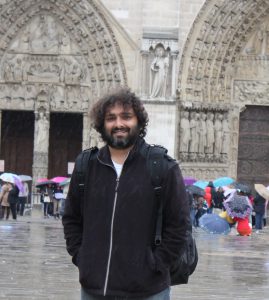Sandeep Eswarappa, from the Department of Biochemistry, and Srimonta Gayen and Ramray Bhat, from the Department of Molecular Reproduction, Development and Genetics have been selected as EMBO Global Investigators in 2021.
They will be active members of the EMBO Global Investigator Network for four years, starting in January 2022, during which they will have access to funding for a variety of networking and training activities.
 Sandeep Eswarappa: Translational recoding of stop codons
Sandeep Eswarappa: Translational recoding of stop codons
Sandeep Eswarappa’s research focuses on translation, the process of making proteins from mRNAs by deciphering the genetic code. Sometimes, the genetic code is misread, resulting in new form of proteins. His lab is interested in understanding the mechanisms and physiological significance of such translational recoding events. They use mammalian cell culture and laboratory mice to understand this process. They also apply the insights gained from these studies to develop strategies to treat genetic diseases caused by nonsense mutations.
 Ramray Bhat: Pattern formation and morphogenesis in cancer
Ramray Bhat: Pattern formation and morphogenesis in cancer
Research by Ramray Bhat’s group focuses on understanding the mechanisms by which cancers of the breast and ovary undergo metastasis. To do so, the group employs a wide range of approaches including 3D tissue and organoid cultures, microscopy, bioinformatics, and computer simulations. In collaboration with groups across the IISc campus, India and abroad, his group’s work integrates microfluidics, active matter physics, and systems pharmacology with classical cell biological approaches. Of special interest is studying how migrating cancer cells cooperate and reorganise into multicellular ensembles to survive hostile body environments and penetrate through natural defense barriers. Preliminary forays highlight novel roles of confining extracellular matrices and heterogeneous presentations of specific sugars in cancer invasion. Ongoing investigations suggest that cancer borrows deeply from principles of organismal development and evolution for its spread. The group’s research is supported by the Department of Biotechnology, DBT-Wellcome Trust India Alliance, and the John Templeton Foundations.
 Srimonta Gayen: Epigenetic regulation of gene expression during development and disease
Srimonta Gayen: Epigenetic regulation of gene expression during development and disease
Srimonta Gayen’s research group strives to further the understanding of the mechanism of epigenetic regulation of gene expression during early mouse and human development, through the lens of X chromosome inactivation, genomic imprinting and random monoallelic autosomal gene expression. The overall goal of his lab is to extend the knowledge from the early development to (a) cancer stem cell biology in order to better understand cancer pathogenesis and provide therapeutic intervention (b) to develop a clinical strategy to prevent the gender bias issue in babies born through in vitro fertilization (IVF) and enhancement of IVF success rate and (c) improving the quality of human iPSC. He is also a Ramalingaswamy Fellow and has received awards such as the Infosys Young investigator award, Merck Young scientist award, and so on.
About EMBO
EMBO is an organisation of more than 1,800 leading researchers that promotes excellence in the life sciences in Europe and beyond. The major goals of the organisation are to support talented researchers at all stages of their careers, stimulate the exchange of scientific information, and help build a research environment where scientists can achieve their best work.
The EMBO Global Investigator Network supports life scientists who have an excellent scientific track record and have been group leaders for at least one but less than six years. They must carry out their research in an EMBC Associate Member State (currently India and Singapore), or in country or territory covered by a co-operation agreement with EMBC (currently Chile and Taiwan).
The network provides the global investigators with several opportunities for exchanges with other scientists both in their region and elsewhere, including EMBO Young Investigators and Installation Grantees. They benefit from funding for visits to other institutions to plan and continue collaborations, give lectures, learn new techniques, or perform experiments. Funds are also available to attend or organise scientific meetings and to receive training in research leadership and management skills.
More information at:
https://www.embo.org/funding/fellowships-grants-and-career-support/global-investigator-network/


 Sandeep Eswarappa: Translational recoding of stop codons
Sandeep Eswarappa: Translational recoding of stop codons Ramray Bhat: Pattern formation and morphogenesis in cancer
Ramray Bhat: Pattern formation and morphogenesis in cancer Srimonta Gayen: Epigenetic regulation of gene expression during development and disease
Srimonta Gayen: Epigenetic regulation of gene expression during development and disease